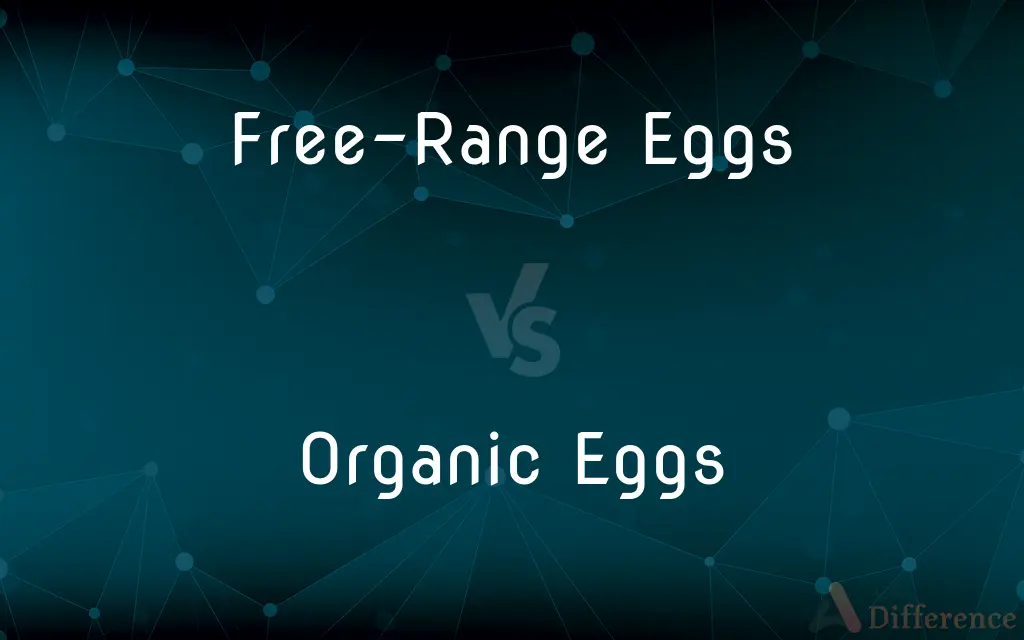Free-Range Eggs vs. Organic Eggs — What's the Difference?
By Tayyaba Rehman & Urooj Arif — Published on February 15, 2024
Free-Range Eggs come from chickens with outdoor access, while Organic Eggs are from hens fed organic feed without pesticides or GMOs, possibly also free-range.

Difference Between Free-Range Eggs and Organic Eggs
Table of Contents
ADVERTISEMENT
Key Differences
Free-Range Eggs and Organic Eggs are terms that describe eggs based on different farming practices focused on animal welfare and feed quality. Free-Range Eggs are laid by hens that have some degree of outdoor access, as opposed to being confined in cages. This means the hens can engage in natural behaviors such as walking, spreading their wings, and foraging, which can contribute to the hens' health and the quality of the eggs.
Organic Eggs, on the other hand, come from hens that are fed an organic diet, free from synthetic pesticides, fertilizers, antibiotics, or genetically modified organisms (GMOs). Organic standards also cover the overall well-being of the hens, including access to outdoor space, making organic eggs also free-range in many cases, but with the added stipulation regarding feed and farming practices.
The key difference lies in the feed and the specific conditions under which the hens are raised. While free-range hens have access to the outdoors, there isn't a strict regulation on what they are fed, as long as they meet the minimum requirement of outdoor access. Organic hens must be fed an organic diet, and the use of antibiotics is restricted, promoting a more natural lifestyle and potentially impacting the nutritional quality of the eggs.
Consumers often choose Free-Range or Organic Eggs based on concerns over animal welfare, environmental impact, nutritional benefits, and personal health preferences. Organic eggs are usually more expensive than free-range due to the higher cost of organic feed and the more stringent farming practices required to meet organic certification standards.
In summary, while both Free-Range and Organic Eggs offer alternatives to conventionally farmed eggs, with potential benefits for both animal welfare and consumer health, they differ primarily in terms of the hens' diet and the specific farming practices used to produce them.
ADVERTISEMENT
Comparison Chart
Outdoor Access
Hens have access to outdoor spaces
Hens have access to outdoor spaces, often with higher standards
Feed
No specific requirements on feed
Must be fed organic feed without synthetic pesticides or GMOs
Antibiotics Use
Not specifically regulated
Restricted use of antibiotics
Animal Welfare
Focus on outdoor access
Comprehensive standards including outdoor access and feed
Cost
Generally lower than organic
Generally higher due to organic feed and certification costs
Compare with Definitions
Free-Range Eggs
Not regulated by feed quality.
Free-range eggs come from hens whose diet isn't strictly controlled.
Organic Eggs
Often encompass free-range practices.
Our organic eggs also come from hens that enjoy outdoor access.
Free-Range Eggs
Aim to support better animal welfare.
Buying free-range eggs supports farming practices that consider hen welfare.
Organic Eggs
Free from synthetic pesticides or GMOs.
The feed for these organic hens is free from synthetic additives.
Free-Range Eggs
Eggs from hens that have access to outdoor space.
I prefer free-range eggs because the hens can roam outside.
Organic Eggs
Meet strict organic certification standards.
These organic eggs come from a farm certified by the USDA.
Free-Range Eggs
Often chosen for ethical reasons.
We choose free-range eggs to support ethical farming practices.
Organic Eggs
Tend to be more expensive due to feed and farming costs.
I'm willing to pay more for organic eggs because of their quality.
Free-Range Eggs
Can vary in outdoor access standards.
The farm ensures its free-range hens have ample outdoor space.
Organic Eggs
Eggs from hens fed an organic diet.
Organic eggs are important to me because of the hens' natural diet.
Common Curiosities
Do free-range or organic eggs taste better?
Taste can be subjective, but some people prefer the flavor of eggs from hens with better diets and welfare.
Are organic eggs worth the extra cost?
Many believe the higher cost is justified by the quality of feed and better farming practices.
Can egg color indicate if they're free-range or organic?
Eggshell color is determined by the hen's breed, not its diet or living conditions.
How should I store free-range and organic eggs?
Store them in the refrigerator to maintain freshness and safety.
How can I verify if eggs are truly free-range or organic?
Look for certification labels from reputable organizations on the packaging.
Do free-range hens live entirely outdoors?
Free-range hens have outdoor access but usually return to barns for protection and nesting.
Are all organic eggs also free-range?
Most organic eggs come from hens with outdoor access, aligning with free-range principles.
Is there a difference in egg nutrition between free-range and organic?
Nutrition can vary based on the hens' diet but is generally higher in eggs from hens with quality feed and living conditions.
Why are organic eggs sometimes not labeled as free-range?
Organic certification includes welfare standards that often surpass free-range requirements, making a separate label unnecessary.
Can free-range eggs be organic?
Free-range eggs can be organic if the hens are fed organic feed and meet other organic standards.
Which is healthier, free-range or organic eggs?
Both can have health benefits, but organic eggs also ensure the absence of synthetic feed additives.
Are there laws regulating free-range and organic egg production?
Yes, there are regulations, but standards can vary by region or country.
How do farming practices for free-range and organic eggs impact the environment?
Both practices aim to be more sustainable than conventional farming, but organic farming has stricter environmental standards.
Can I find free-range and organic eggs at any grocery store?
Availability can vary, but many stores now carry both types due to increasing consumer demand.
Do free-range or organic eggs have a longer shelf life?
Shelf life is generally similar for both, depending on freshness at the time of purchase and storage conditions.
Share Your Discovery

Previous Comparison
Digital Zoom vs. Optical Zoom
Next Comparison
Nikon D5100 vs. Nikon D5200Author Spotlight
Written by
Tayyaba RehmanTayyaba Rehman is a distinguished writer, currently serving as a primary contributor to askdifference.com. As a researcher in semantics and etymology, Tayyaba's passion for the complexity of languages and their distinctions has found a perfect home on the platform. Tayyaba delves into the intricacies of language, distinguishing between commonly confused words and phrases, thereby providing clarity for readers worldwide.
Co-written by
Urooj ArifUrooj is a skilled content writer at Ask Difference, known for her exceptional ability to simplify complex topics into engaging and informative content. With a passion for research and a flair for clear, concise writing, she consistently delivers articles that resonate with our diverse audience.
















































